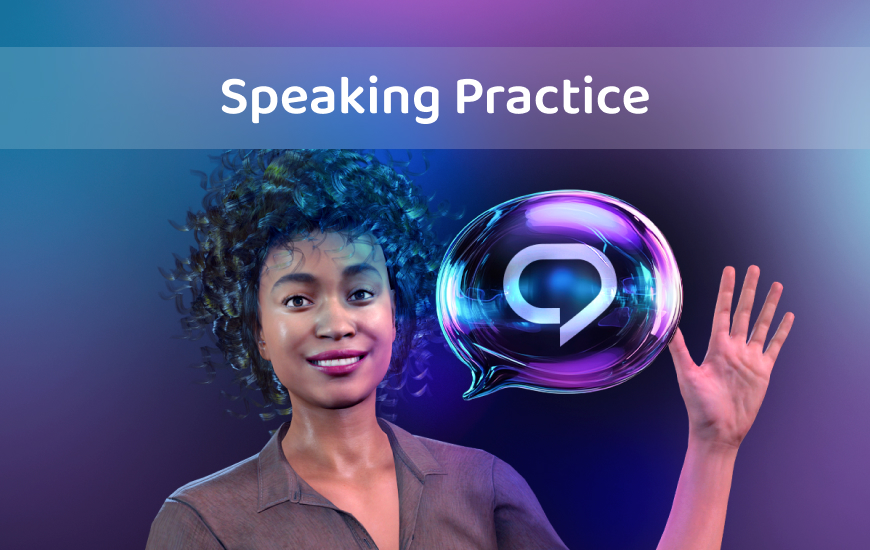Hi, lovely wanderer! I’m Alisha! As someone who’s traveled the world and adjusted to different cultures, I know firsthand that the biggest hurdle when learning a new language is speaking. You can read all the grammar books and memorize all the vocabulary flashcards, but if you don’t actually practice speaking, you won’t get fluent. Today, we’re diving into why conversation practice is the secret to fluency and how AI-powered chats (with me, of course! ) can help you think in English and avoid awkward translation traps. Let’s get started!
Flashcards Won’t Save You (Sorry, Not Sorry)
Look, I love a good flashcard as much as the next person, but memorizing random words won’t help you order coffee or make small talk. You might know the word coffee, but what will you say when someone asks, “Would you like sugar and cream?”
Here’s why traditional methods fall short:
| Method | What Happens in Real Life | Why It’s a Problem |
| Flashcards | You memorize the word coffee but freeze when someone asks, “Would you like cream and sugar?” | You know the word, but not how to respond. |
| Grammar drills | You know how to conjugate to be but can’t say, “I’m lost. Can you help me?” | You overthink every sentence, slowing down your speech. |
| Translation apps | You rely on translating from your native language word-for-word. | Conversations sound awkward and robotic. |
Here’s another example! Imagine you’re traveling in London and want to ask for directions to a museum:
- Using a flashcard approach:
You know the words museum and street, but you can’t form a question like, “Excuse me, how do I get to the museum?” - Using conversation practice:
You’ve already practiced this with me in a role-play, so you confidently say:
“Excuse me, could you tell me how to get to the British Museum?”
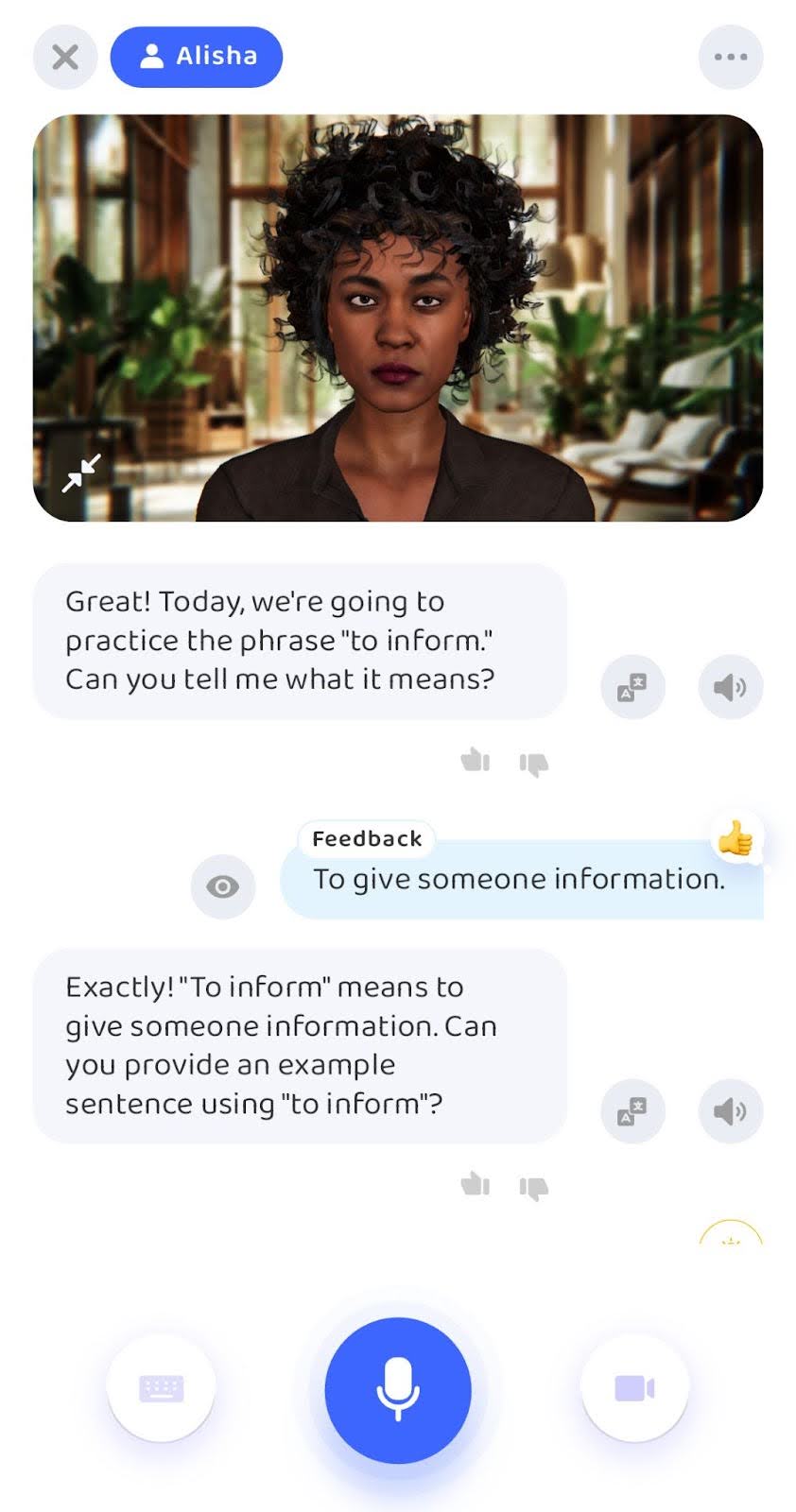
To become fluent, you need to speak regularly. Practice new words, phrases, and conversations with me, your AI English tutor, in the Praktika app to build your confidence. In the Word of The Day lesson you get to not only learn a new word, you learn how to use it naturally in different situations.
Want to Think in English? Stop Relying on Grammar Rules
Have you ever felt stuck because you’re trying to remember the right grammar rule before saying a sentence? If so, you’re not alone! Many English learners spend too much time thinking about rules instead of just speaking naturally. And guess what? That’s slowing you down.
Here’s a little secret: Native speakers don’t think about grammar rules while they talk. They don’t pause to figure out verb tenses or prepositions—they just speak. That’s the goal for you too! You need to stop translating from your native language and start thinking in English without overthinking grammar.
The Overthinking Problem
Let’s look at a typical scenario:
You’re at a café, and the barista asks: “Would you like anything else with that?”
Here’s what happens if you’re stuck in grammar mode:
- In your head: “Okay, I need to use the conditional tense here. What’s the rule for that again? Oh no, I forgot the right verb form!” 😰
- You freeze.
Instead, here’s what happens if you’ve practiced real conversations:
- You confidently reply: “No, thank you. That’s all!”
See the difference? The first approach makes you feel anxious. The second feels natural because you’re thinking in English, not translating or analyzing grammar rules.
How to Build Automatic Responses
The best way to think in English is to practice common phrases and responses so they become second nature. Here are a few examples:
| Scenario | Grammar-Focused Thinking | Natural English Thinking |
| Ordering food | “Uh… I want… maybe… chicken?” | “I’ll have the grilled chicken, please.” |
| Asking for directions | “How… do I get… to… station?” | “Excuse me, where’s the train station?” |
| Introducing yourself | “I am… name… Alisha.” | “Hi! I’m Alisha. Nice to meet you!” |
💡 Alisha’s Tip: Start with small, everyday phrases. The more you practice saying them, the more natural they’ll feel—and soon, you won’t even need to think about grammar rules at all.
The Translation Trap: Why It’s Slowing You Down
If you’ve ever found yourself silently translating every word from your native language before speaking English, you’re stuck in what I call the “Translation Trap.” Trust me, I’ve seen it happen a lot! And while it feels like a natural way to learn, it actually makes your speech slower, more awkward, and less confident.
Here’s why:
- You think of what you want to say in your native language.
- You translate it into English word-for-word.
- You say it out loud (usually with a pause… or two… or five).
This process takes forever and can make conversations feel like solving a puzzle instead of just chatting naturally. So how do we avoid the Translation Trap? Let’s talk about it!
Why Translation Doesn’t Work
When you translate word-for-word, the sentence often sounds strange in English. That’s because languages aren’t built the same way!
Here’s an example:
Translated Sentence: “I have hunger.”
Natural English Sentence: “I’m hungry.”
See the difference? In English, we don’t say “I have hunger”—we use “I’m hungry.” This is why translating directly doesn’t always work.
How to Stop Translating and Start Thinking in English
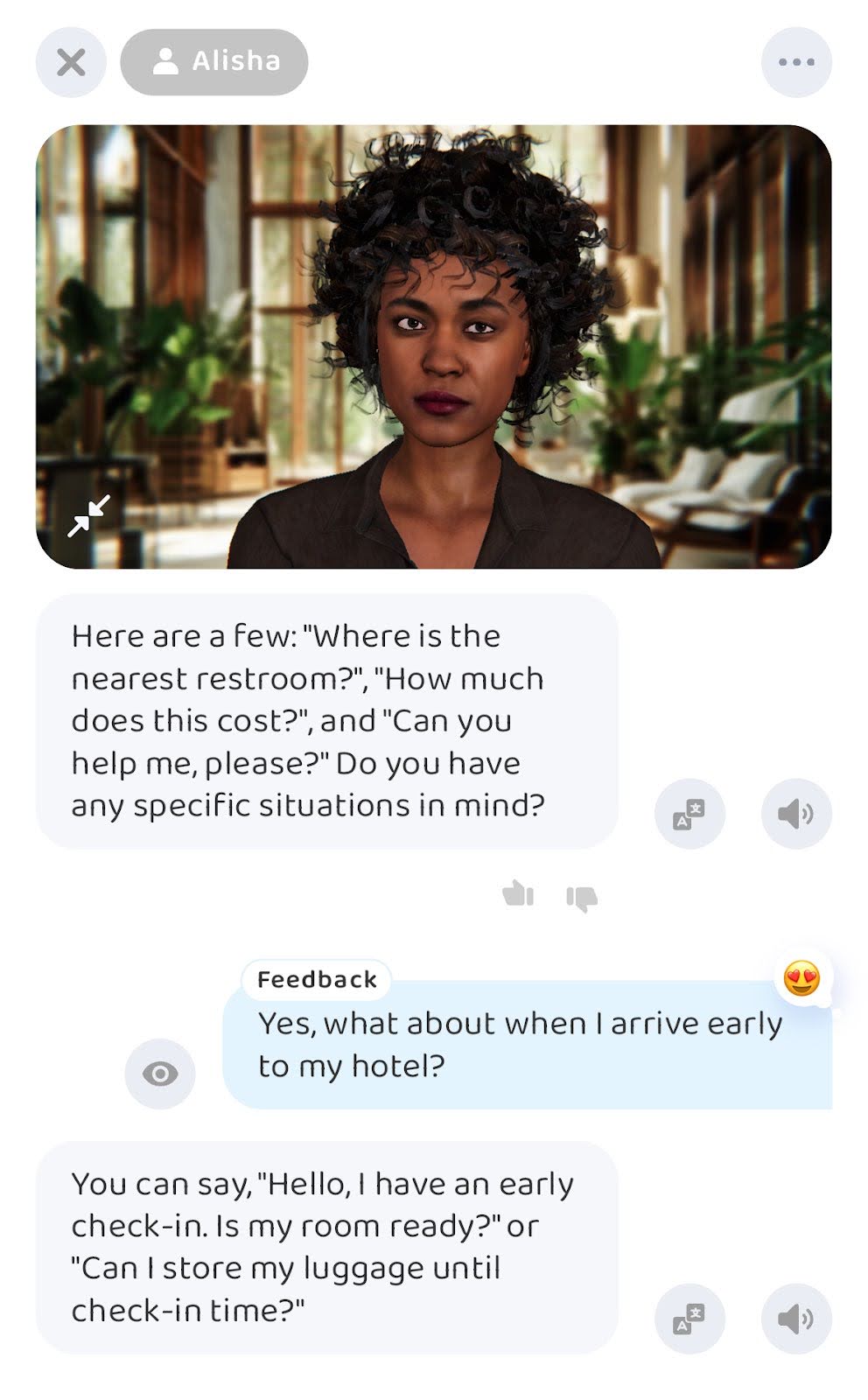
Tip 1: Practice Short Phrases in English
Start with simple, everyday phrases that you’ll actually use, like:
- “Can I get a coffee, please?”
- “Where’s the nearest bathroom?”
- “Nice to meet you!”
Tip 2: Learn Common Expressions
English has a lot of expressions that don’t translate directly. For example:
- “Break the ice” = Start a conversation.
- “Hit the road” = Leave or start a journey.
- “Piece of cake” = Something easy.
The more you know these expressions, the less you’ll rely on translating. I’m in the Praktika English learning app ready to help you practice as many times as you need!
How AI Conversations Help You Build Confidence
Learning English can feel intimidating, especially when you’re worried about saying something wrong or sounding awkward. Believe me, I’ve been there! When I was learning Italian, I had moments of pure panic—like when I accidentally asked for a kitchen instead of a spoon at a restaurant. *facepalm* One thing that really helped me, though, was practicing conversations in real situations. But you don’t need to move to another country to get that kind of practice—you can do it with AI-powered conversations right here in Praktika! Let me show you how practicing with me can help you build your confidence, one chat at a time.
1. No Judgment = No Stress
When you practice with me in Praktika, there’s no judgment and no awkward moments. You can make mistakes, laugh them off, and try again. I’ll guide you through real-life conversations in a way that feels natural and fun.
Example:
If we’re practicing introductions, I might ask: “Hi! I’m Alisha. What’s your name?”
You can respond without pressure, and if you need help, I’m right here to assist.
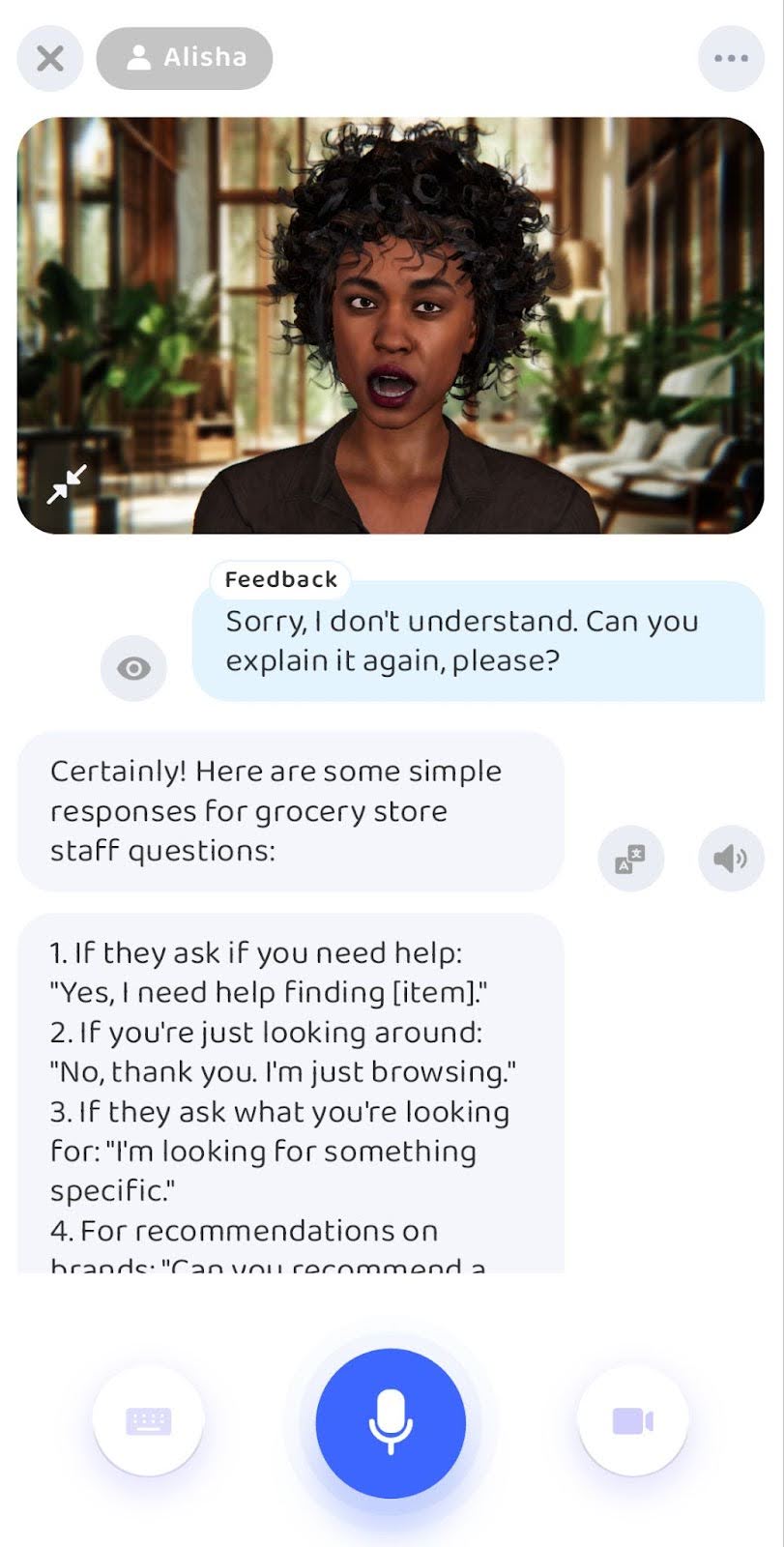
2. Personalized Scenarios for Real-Life Situations
Because I’ve traveled a lot, I know the kinds of situations you’ll encounter when you’re adjusting to a new culture. We can practice conversations that match your real-life needs:
- Ordering food at a café:
“I’ll have a cappuccino, please.”
“Would you like anything to eat with that?”
- Asking for directions:
“Excuse me, how do I get to the train station?”
- Meeting new people:
“Hi! I’m new in town. Nice to meet you!”
These are the conversations that help you feel more at ease when speaking English. I’m happy to help you every step of the way.
3. Instant Feedback Without Interruptions
One of the hardest parts of speaking practice is knowing if you’re saying things correctly. In Praktika, I’ll give you instant feedback to help you improve, but I won’t interrupt the flow of our conversation.
So don’t worry about perfection. Focus on understanding and being understood. The more you speak, the better you’ll get!
4. Build Confidence by Talking About What Interests You
The best way to build confidence is by practicing conversations that interest you. Want to talk about travel? Great! I’ve got lots of stories to share about my adventures in different countries.
Want to prepare for a trip to an English-speaking country? We can practice travel scenarios together, like checking into a hotel or ordering food at a restaurant.
Example:
“What’s your favorite destination?”
“I love visiting London—it’s such a lively city!”
Bottom Line:
AI-powered conversations help you get comfortable with real-life English, boost your confidence, and make mistakes without fear. The more you practice with me, the more ready you’ll be to handle any situation—whether you’re traveling, meeting new people, or adjusting to a new culture.
Make Speaking Practice a Daily Habit (Without Overthinking It)
When it comes to learning English: Consistency beats intensity. You don’t need hours of study time every day. Even just 5-10 minutes of speaking practice can make a huge difference if you do it regularly.
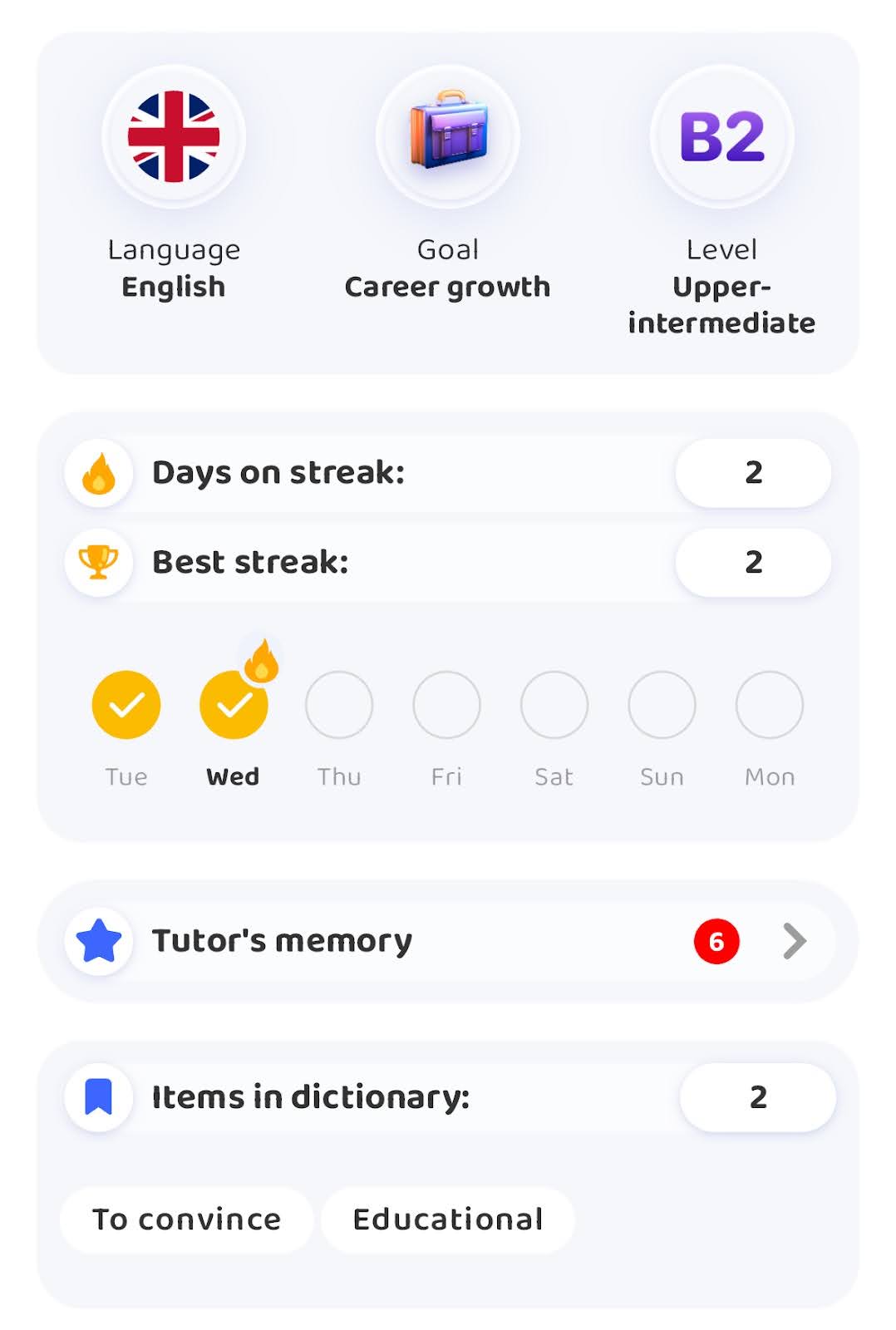
1. Listen, Repeat, and Sound More Natural
One of the easiest ways to improve your English is by listening to native speakers and repeating what they say. And guess what? Praktika has beginner and intermediate playlists on Spotify! 🎶
Pop on a podcast or music playlist while you’re cooking, commuting, or cleaning, and practice repeating short phrases out loud. It’ll help you get used to natural rhythms and intonation in English.
2. Talk to Me on Praktika (and Earn Friendship Points!)
You don’t need to wait for a formal lesson to practice speaking. Just open Praktika and chat with me! The Word of the Day lesson only takes 3 minutes, and it’s a fun way to add new phrases to your vocabulary. By practicing, you’ll also earn Friendship Points with me and other AI English tutors. It’s like building a relationship with your own personal language coach (and I love making new friends!).
3. Keep a Conversation Journal
Every time you learn a new phrase, write it down in your conversation journal and practice saying it out loud. Write down questions too! For example: “How else can I ask for the check politely?” Then, come back later and try using it in a sentence with me on Praktika.
4. Plan Your Next Adventure in English
If you’re planning a trip to an English-speaking country, imagine real scenarios you’ll face. Practice ordering food, asking for directions, or chatting with locals. And if you’re not traveling soon, pretend you are!
💡 Alisha’s Travel Hack:
Pick a country you’d like to visit and practice conversations specific to that destination. Heading to London? We’ll practice ordering fish and chips. Dreaming of New York? Let’s chat about taking the subway!
Stop Memorizing—Start Speaking!
If you want to become fluent in English, speaking practice is key. You don’t need to memorize endless vocabulary lists or perfect every grammar rule. What you need is real conversations that help you think in English. With Praktika’s AI-powered chats, you’ll get that practice in a fun, friendly, and judgment-free space. So, what are you waiting for? Let’s start chatting in the Praktika app and make English fluency a reality!

From Alisha
Alisha is your cheerful American AI English tutor from Praktika. With a background in linguistics from Stanford, she makes every lesson engaging. Whether practicing casual conversations for travel or complex topics, she’s here to guide you with personalized tips to boost your English skills and confidence!
